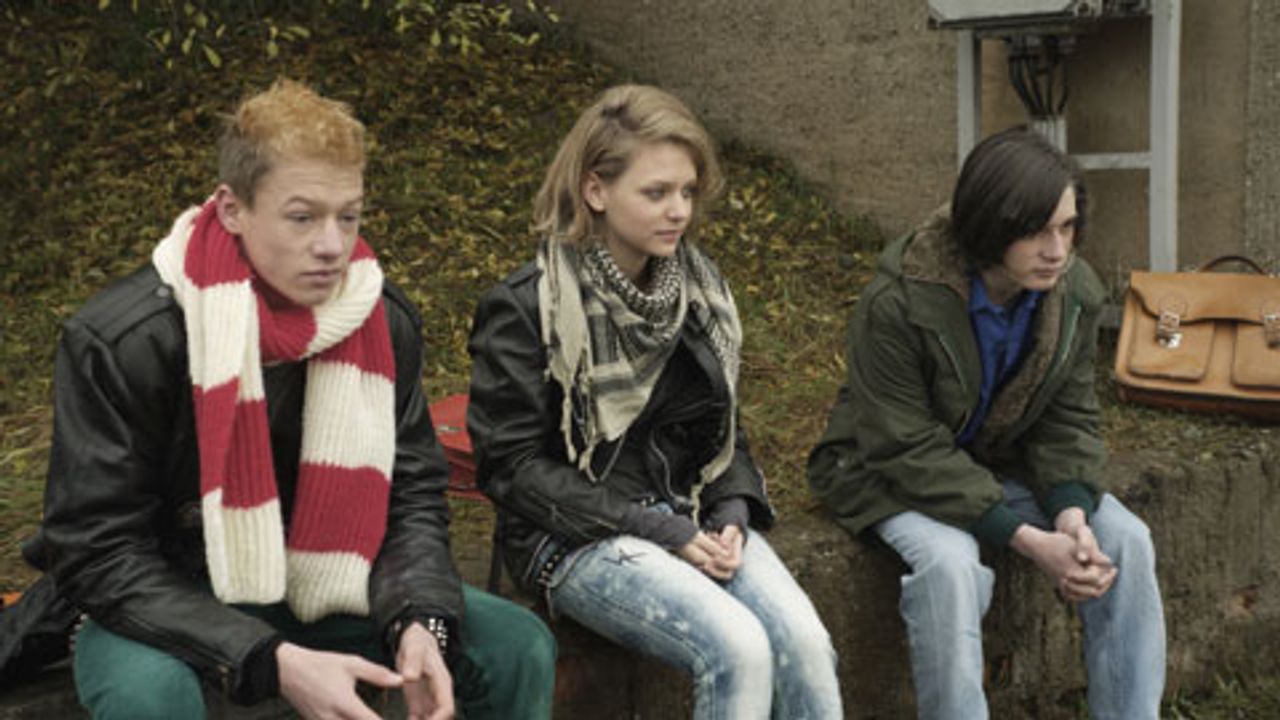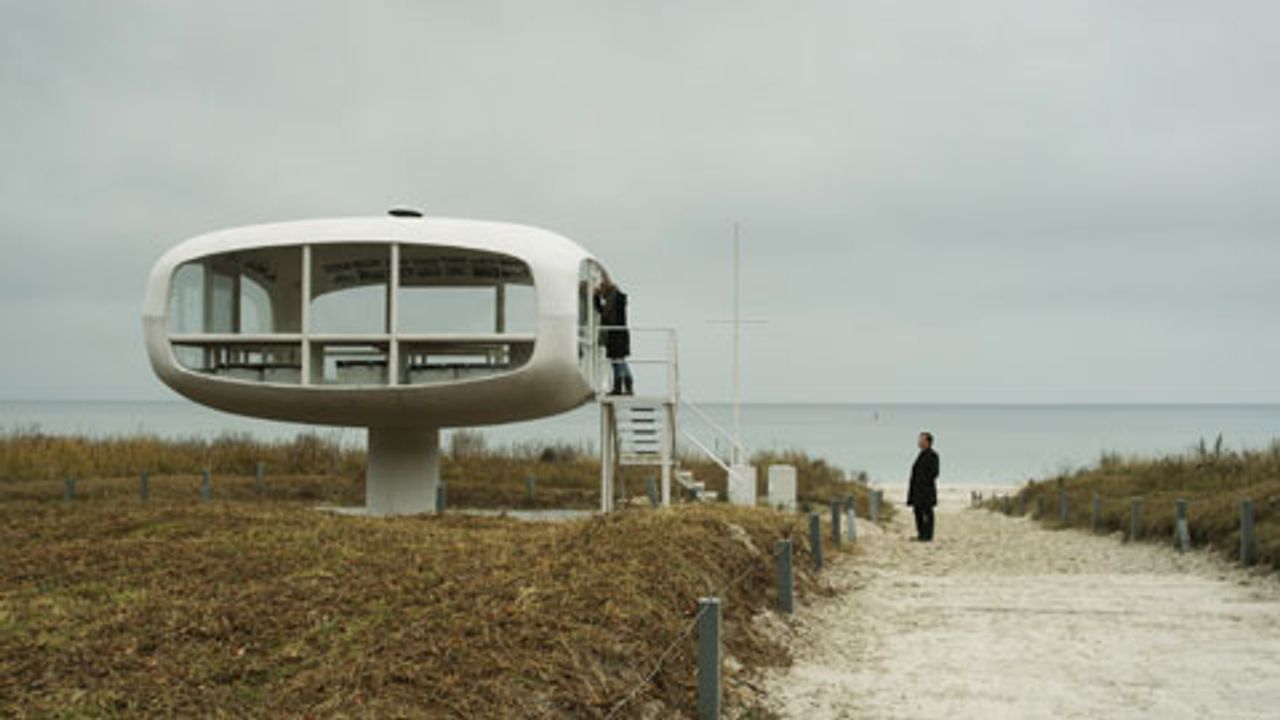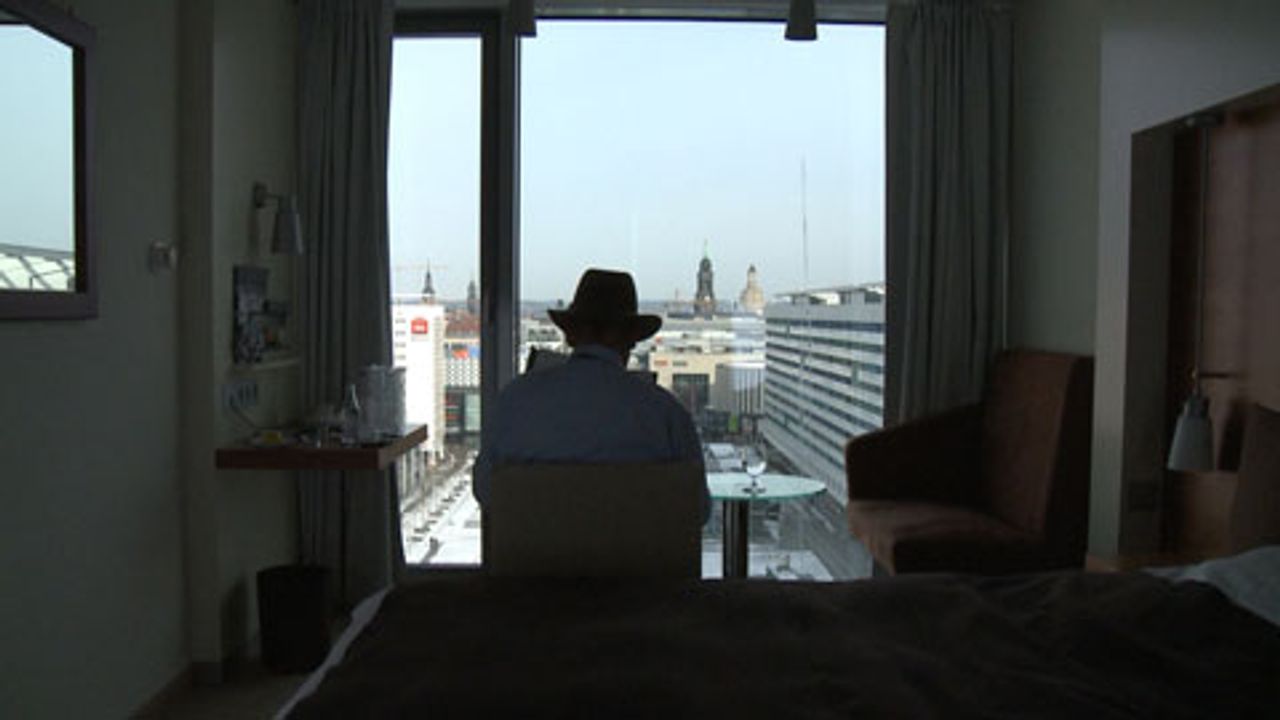This is the fourth in a series of articles on the recent Berlin film festival, the Berlinale, held February 10-20, 2011. Part 3 was posted on March 11, Part 2 on March 7 and Part 1 on March 3.
At this year’s Berlin International Film Festival, two remarkable new works about the former German Democratic Republic (GDR) were offered by directors who were themselves brought up in Stalinist East Germany.
“What made me what I am today? How we did we come to be where we are today? How much of the past is determining the present?” Legitimate questions, one has to say.
 The Prize
The PrizeThe feature film The Prize by Elke Hauck (born 1967) is concerned with her own generation, which had no regrets about saying goodbye to the GDR in 1990, “because the new world was much more exciting”. According to the film’s press notes, it is a generation now daring to explore “with conflicting feelings” where the process of reunification in 1990 “all began”.
Alex, an architect living in West Germany, has won a prize for a project involving the reconstruction of a former East German housing estate in the Thuringian town of Gera. It is the housing estate where he grew up, and where things happened that he has long repressed: his best school-friend at that time, Michael, took his own life and Alex feels complicit in the tragedy.
It was the time just before the fall of the Berlin Wall. Michael feels the huge gap between official slogans, celebrating the supposed successful advance of socialism, and sober reality. At school he asks teachers uncomfortable questions but gets no answers, becomes a Punk, tells everyone he is anti-Communist, and reads the West German teenager magazine, Bravo. It seems he is about to slide into a life of petty crime.
When the school is set to decide whether Michael is worthy of a place in a sports academy, Alex happens to be a member of the review panel owing to his status as the class representative of the Free German Youth (FGY—official Stalinist youth movement in the GDR). While a woman teacher argues he should be given a chance, Alex speaks out against Michael, saying he is not yet “mature” enough.
 The Prize
The PrizeHowever, his real reason for saying this stems from a personal grievance. Alex is taking revenge on Michael because the latter doesn’t want to have anything more to do with the “conformist” Alex, and has prevented him from seeing his sister Nicole, with whom Alex is in love.
The film conveys the story in a series of still images. Focus continually switches back from the present to the past of these former East German young people, as though it were not yet clear what would later become of each of them—or was it predictable, after all? A once zealous FGY girl becomes a servile eager-to-please hotel employee, and Alex adapts to the capitalist world as well as he adapted himself to the GDR.
Directly confronted with the facts of the past, however, he feels uncomfortable and turned off, especially when it comes to the former old “big shots” of the eastern German housing firm responsible for the Gera housing estate. By the end of the film, he has mellowed, has declared his feelings to Nicole, and gives in to the housing firm, which is calling for cost-cutting measures in the building project. Fearing rent increases, the tenants were not in favour of any radical architectural experiments, anyway.
The film focuses mainly on Michael. He is certainly hostile to some aspects of life in the GDR and deeply irritated by the lies and political whitewashing perpetrated by its officials. Less attractive is the wavering student, Alex, who eventually turns traitor.
Still lacking stability of character, Alex learns how to exercise so-called “social responsibility” in line with his role as the class’s FGY functionary. Under the mantle of the FGY, he can rise to a higher social status than his classmates and Michael, without having to truly justify himself.
Elke Hauck, the film’s director, does not concern herself with how the Stalinist apparatus actually succeeds in establishing these social dynamics. She said in an interview that she was reluctant “to lay the blame on the apparatus itself”, because in the GDR it was simply a matter of those who “conformed” and those who “refused to conform”. The film’s press information refers to the Stalinist state’s culpability in this respect as “responsibility on a small scale”.
The Prize thus leaves us with mixed feelings: it bears witness to the personal histories of former GDR citizens, showing the difficulties the youth in East Germany had to contend with; but it tends to reduce their problems to psychological issues. Or, as Hauck said in an Internet interview (baerlinale2011.de): “Some people conform and so they cope with life better than the ones who don’t conform”.
However, personal corruption and betrayal on the part of many people in the GDR cannot be explained without understanding the role of the Stalinist bureaucracy. Its claim that it was acting in the interests of the working class and building socialism was a lie, which served to demoralize the population and suppress any democratic critique from below.
Despite this, a deep concern has apparently spread through the generation that burst enthusiastically into the new world of seemingly unlimited possibilities after the collapse of the GDR. Sympathy is growing for those who do not conform to prevailing conditions under capitalism.
Traitor to the Fatherland
Traitor to the Fatherland is a documentary by Annekatrin Hendel, dealing with the former East German writer and Stasi spy, Paul Gratzik (born 1935), who now lives in retirement on a farm in Uckermark in eastern Germany.
 Traitor to the Fatherland
Traitor to the FatherlandGratzik came from a poor farming family. As a child, he lived through the Allies’ wartime bombing in Mecklenburg, completed an apprenticeship in carpentry, worked for a time as a collier, began teacher training in 1963, and worked in education. From 1971, he was a freelance writer with a sideline job in manufacturing, and eventually became a contracted writer for the renowned Berlin Ensemble.
The year after the construction of the Berlin Wall was very significant for Gratzik. In 1962, he was a Free German Youth functionary in Weimar, while simultaneously acting as an informer for the Stasi (former East German security service). The Stasi arranged for the publishing of his novel Transportpaule in 1977, and his second novel Coal Dust Clothes appeared in the West in 1982.
Having worked with the secret police for 20 years, he became a “traitor to the fatherland” in the 1980s, leaving the service and informing colleagues about his job with the Stasi. He believed the Stasi was “counter-revolutionary”, was himself now spied upon by a writer colleague, whom he had earlier assisted (and tailed), and lived in fear of being assassinated by the Stasi. Gratzik adopts a cynical attitude in the film, seeing himself as politically degenerate, but simultaneously a Communist.
Among the film’s more interesting moments are references to the close relationship between the Berlin theatre-literary scene and the Stasi. The former editor of West Berlin’s Red Book publishing firm—which published Gratzik’s Coal Dust Clothes—explains in the film that a large percentage of those involved in the East German literary scene were connected with the Stasi.
For his part, Gratzik was certainly not a run of the mill careerist, but considered himself a socialist who wanted to improve the GDR by writing books critical of the regime. He even used his experience with the secret police as part of this criticism. For example, he shows his support for the playwright, Heiner Müller, by including his secret report on the man. We learn through the film that the Stasi consciously tried to win people like Gratzik, who retained their loyalty to the GDR despite harbouring a critical attitude to it.
A saying of his mother continued to resound in Gratzik’s mind: “The country’s greatest enemy is and always will be the informer”. But, according to an interview with the director, he only began to think about getting out of the Stasi after songwriter Wolf Biermann’s expulsion from East Germany in 1976.
The special relationship between many of the artists and the Stasi raises the question of what most of the intellectual “GDR opposition” understood by the slogan of a democratic East Germany around the time of German reunification. Cinema viewers learn that the actress, Steffi Spira, was in close contact with Gratzik, and found out about his work with the Stasi, when he told her of his intention to quit it. Spira became popular in 1989 because of her speech at the Berlin Alexanderplatz rally on November 4, 1989, when she called for a more humane socialism in the future “without naming any names” —that is, without blaming anyone in the old order.
It is to the film’s credit that it has introduced the audience to such a contradictory and inwardly torn person as Gratzik. In addition to the quick-tempered writer, the director has managed to capture on the screen contemporary witnesses, Gratzik’s former colleagues and friends. For example, Hendel is even able to get Gratzik’s former Stasi commanding officer to appear before the camera, a rare achievement. The film shows Gratzik to be a person of quite a different calibre than the murky fictional Stasi agent in The Lives of Others (2006), the prize-winning film by Florian Henckel von Donnersmarck. That Stasi officer was very much a fictional rather than a realistic figure.
The film, unfortunately, does not capture the concrete historical circumstances, including the tragedies of German history that produced a Gratzik. He could only have emerged under quite specific circumstances.
On the other hand, Gratzik offers his own reasons for his conduct, which the viewer does not need to accept. He complacently explains to the director in the course of film that the global context has to be understood before one can be in a position to judge him. The film’s Internet homepage depicts Gratzik as someone who “has to be cursed and liked” at the same time. Was Gratzik actually a tragic victim who worked hard to bring into existence a supposedly worthy “utopia”?
Towards the end of the film, his words and gestures betray a certain amount of self-satisfaction. As an old cadre, he is accustomed to paying attention to popular moods, and has rightly observed that public interest in the issue of socialism is once again growing in view of the current capitalist crisis. His public attacks on capitalism have been sympathetically received.
While The Prize is distinguished by an ambivalent attitude towards the GDR, Annekatrin Hendel’s work shows an appreciation for Gratzik’s “idealism”. According to the director, it was not supposed to be a film about “how bad it used to be in the GDR”. Instead, she wanted to use the example of a perpetrator to show, “how absurd the GDR was.... The spy was the spied upon”. Such a finding, however, hardly amounts to much.
The “absurd” character of East German society in its final phase was an expression of the bankruptcy of the Stalinist policies that oppressed it. Hidden behind the government’s slogan, “No one can stop the progress of socialism”, was the desperate fear of an opposition movement arising from below. The regime reacted to this with an hysterical attempt to spy on broad sections of the population, while simultaneously paving the way for the reintroduction of capitalist relations.
To be continued
